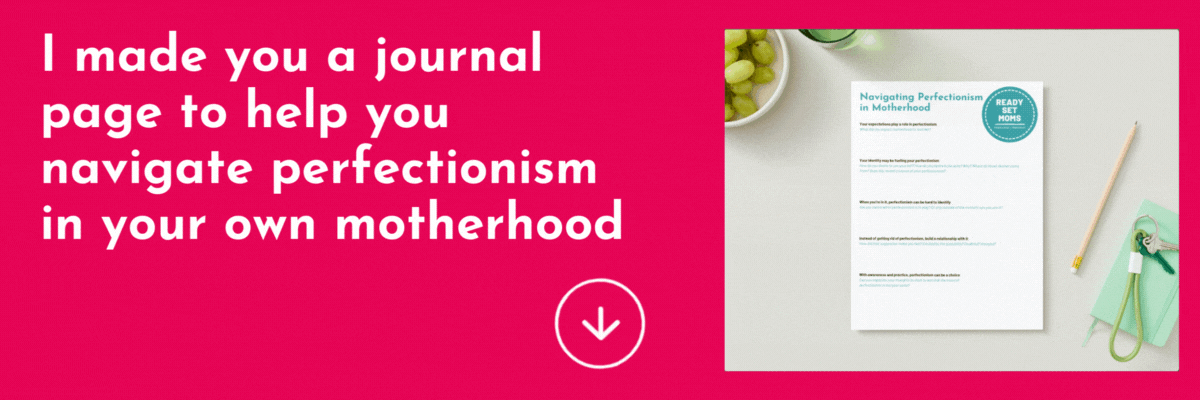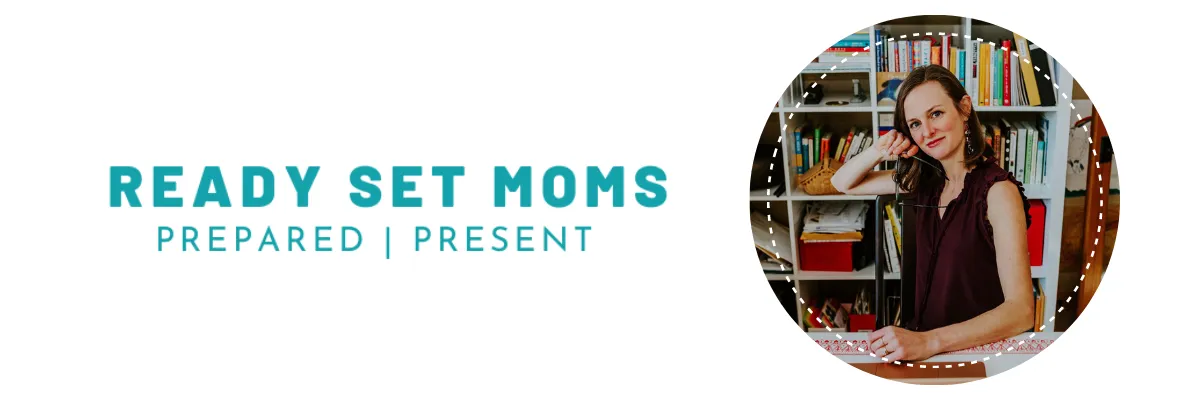Want to Navigate Perfectionism in Motherhood? Here's How
Mollie Birney, clinical life coach and former therapist, joins Erika Friday, mom-life coach, to explore the role of perfectionism in parenting. We cover:
- Why we experience it (for example, maybe you’re a high achiever or you put too much pressure on yourself to be the best mom…)
- What it sounds like
- What we can do about it when we realize it’s harming us (avoid the chronic stress and strive for a better balance!)
- And more

Perfectionism in Motherhood
This post is all about navigating perfectionism and the pressure of expectations in motherhood. This honest and playful conversation between two expert coaches and recovering perfectionists will help you release some of that pressure and find your own kinder way forward — in motherhood and life.
Are you someone who grew up with perfectionist parents? Do you worry you’re not a good mom? Are you eager to let go of perfectionism? Do you place high expectations on yourself, or think others have high expectations of you? Do you often feel like you have to be the perfect mother?
If you answered yes to any of those questions, it’s my hope that this interview with Mollie Birney will help you better understand why you may be in pursuit of perfection and what you can do when you feel like you’re failing at being the “perfect mom” or the “perfect parent.”

The role of expectations in perfectionism
Erika: In my own lived experience, I believe that perfectionism doesn't always look like every hair in place while my kids are perfectly well mannered and well dressed. I think it can look any number of ways, and that's what makes it so insidious and so surprising when people realize, “Oh, what's happening here might actually be perfectionism.” So I'm curious in your own life or in your practice either as a therapist or as a coach, how does perfectionism show up for parents? What does it look like?
Mollie: Oh my goodness. This is such a great question. One of the things I'll share is I didn't have any expectations of myself as a mother. When I go to learn a sport, I have an expectation of myself as an athlete, so I have something to prove. But I didn't have any expectations of myself as a nurturer, that I was gonna know how to do this, so I had the freedom to ask all the questions and people could give me books. At no point did it erode my sense of self.
But my husband has heard his whole life what an incredible dad he's gonna be, and so he ended up with a whole lot more self abuse that sounded like, “I should know how to do this.” He struggled to ask for help because he's the one who's supposed to be the incredible dad, so he's thinking, “Why haven't I figured this out?” So I'd watch his frustration with himself rise faster than mine because I didn't have any idea that I was supposed to know.
Now there are plenty of areas in which I do have perfectionism. It just doesn't show up around expecting that I'm supposed to know how to parent. So, you know, perfectionism can show up with being extraordinarily hard on ourselves. It doesn't mean that every hair is in place. It means that we're deeply scrutinizing anything we're looking at.
Perfectionism, I think, also looks like not being able to tolerate our own incompetence or our own learning curve, having no tolerance for being in a beginner's mind about this sort of thing, which I get it. Certainly, all I am is beginner's mind around parenting because I don't have any ego around it in the way that I think some people do. But I don't know, there are plenty of ways in which that is helpful and isn't helpful, but at least [having beginner’s mind] allows me to get support and resources when I need them as opposed to feeling shame. “What's the matter with me that I need these resources?” You know?
Erika: Yeah. Have you coached anybody through perfectionism specifically regarding parenting?
Mollie: For the people for whom perfectionism shows up, there are plenty where it inhabits parenting and career or finances or body image. And it's rare that it's absent from one area and just in one place.
Erika: I think what I just heard you say is if somebody's perfectionistic in their work or in their body, they're likely also perfectionistic in parenting?
Mollie: I think it's hard to say that it's black and white because, again, I, for one, have perfectionism in some areas and a little more space in others. And part of this was my own relationship to my femininity being like, “yeah, I don't I don't know how to do this thing. I'm not like other women.” So there was an identity in my resistance to it, too. But generally, this is very broadly speaking: If perfectionism is showing up in one area, we usually see that pattern of thought, or pattern of high expectation, or pattern of being particularly brutal with ourselves show up in other areas. Yeah.
Ask yourself: What did you expect motherhood to feel like?
The source of your perfectionism: values vs identity

Erika: I was talking to my mom about how I've identified that perfectionism is something that holds me back in my business. She did this double take, and she goes, “You think you're a perfectionist?” Which was hilarious.
Mollie: Sounds good. Validating.
Erika: She is the person to whom things seem to come very easily and every hair is in place.
Mollie: Gotcha. So that's one expression of perfectionism. Sure.
Erika: That is the poster child expression of perfectionism. And she sees me, and I'm perfectly happy to let my kids run around in stained clothing and throw my hair in a ponytail, and so she does not see me as her brand of perfectionism.
So the conversation went on, and it was interesting and nonjudgmental and very funny. And she suggested, why don't I take one area of my life where perfectionism is not in play, and she had a long list of examples, and apply it to areas where it is a problem.
So, for example I'm comfortable with my front stoop being in need of a brooming, and yet perfectionism will really hold me back from a big project at work. So she's like, can I take this and apply it to that? And I'm having a hard time actualizing what is on the surface a pretty good suggestion.
Mollie: To be able to take this and apply it to that?
Erika: That’s my question for you. She says, “Erika, if you're able to be loose in certain areas in your life, but you're uptight and perfectionistic in others, can this part of Erika teach this part of Erika?”
Mollie: Here's why I would say no, why it might be a struggle. (Please tell me to pump the brakes because I don't wanna get into coaching you because I realize it's not what you signed up for.) But, usually, the reason we have perfectionism in particular areas is we have an identity. There's a way we need to be seen, so there's a quality in ourselves that we're promoting.
I have perfectionism in my career because I'm really identified with my career. I wanna be seen as credible. I wanna be seen as successful. I wanna be seen as smart. I wanna be seen as not another dumb blonde. This is just my internalized misogyny that you're hearing. But, yeah, that's the identity, which is always driven by fear, and shame is showing up in that area. Yeah. That's where my perfectionism is going to show up.
I don't have an identity as a mom. I don't need to be seen as this incredible mom and this source of wisdom. I don't have any quality that I'm promoting, which is why I have no problem being a beginner.
I would argue then that you have some identity around career, not in your craft. Because, Erika, I bet when you're working with clients, you're brilliant. You have total clarity. You don't have noise about it. You're not going, “Well, what do they think right now?” You're clear on what you're offering. But when it comes to your parenting, there might be more of a sense of “I'm supposed to know how to do this. I better take care of this. I want my kids to see that. I want my colleagues to see this.” And by the way, why wouldn't that be part of your career given that you're a mom coach?
Erika: And now I’ve even woven those two identities together.
Mollie: But there's no identity around needing to be seen as someone with a clean house necessarily.
Erika: Yeah. Exactly.
Mollie: If you’re not looking to promote the quality, there's not gonna be any perfectionism there.
What we might be curious about, though, is the freedom to be seen as messy around the area of homekeeping, but there's no freedom to be seen as messy as a parent. And if you don't have the freedom to be seen in that particular way, there are certain conversations that are off limits to you. You can't ask for help. You can't use your resources. You can't go public about where you're struggling, and so that struggle can't be a contribution to anyone else. It’s like there are whole parts of town in that conversation you can't go to.
Erika: I wish we had had this conversation 6 years ago.
Mollie: Probably. There's me too. I relate.
Erika: I'm also in love with this concept of identity rather than values. It's almost easier for me to go to values. For instance, “I value that my children are healthy and happy. I don't value that they are dressed all in beige and pink.” Which is true. But this thing about identity just gets to the heart of it so much faster.
Mollie: Value is more of a conceptual model. If you ask me how I need to be seen, I could list the adjectives right now. But, there's something a little bit separated about what are my values? What are my priorities? And so a lot of coaches will go in that line of, “Well, is it in alignment with your values?” That's an intellectual conversation. But if you ask me about my identity, I'm in my body, in my nervous system, my reactivity. So I think there's more information in that form of the conversation. Does that make sense?
Erika: And values you can't really argue with. But identity has 2 parts. How do I see myself, and how do I need to be seen? Oh, it's so rich. I'm really gonna have a lot to think about.
Ask yourself: How do you desire to see yourself? How do you desire to be seen? Why? Where do those desires come from? Does this reveal a source of your perfectionism?
When you're in it, perfectionism can be hard to identify

Erika: So if perfectionism could look all these different ways, when you see somebody struggling and you know as the outsider and the professional, that perfectionism is at play, do they?
Mollie: Sometimes No. Because usually a perfectionist has their eye on the results. Even if the form of perfectionism that's showing up is procrastination: “I can't start until I have it all worked out,” or “I can't start because I don't know what I'm doing.” That's still related to the results. It's not about the process. So until you’re clear that you're avoiding the process because you're making the results more important, rarely do you see for yourself that perfectionism is in play. But that's usually when I start with clients.
We're building a foundation of awareness. I'm not trying to get you to change your perfectionism or challenge your perfectionism. I just want you to see that it's there because the first step to getting out of prison is agreeing that we're in prison. If we think we're free, there's no escape. So let's say that you wouldn't choose to allow the results to keep you from even starting. You wouldn't choose to beat yourself up in this way. That's not happening by choice. That's a reaction. That's a function of a survival system in play. So I think there's a lot of education and normalization that folks tend to need before they can even talk about how we intervene on it.
Erika: That's perfect. And I think that might apply to a mother by helping her identify when she's being so hard on herself. That internal voice that's so mean.
Ask yourself: Are you aware when perfectionism is in play? Or only outside of the moment can you see it?
Instead of trying to get rid of perfectionism, build a relationship with it

Mollie: So cruel. I talk a lot about building a relationship. Build a relationship with your thoughts. Build a relationship with your career. Build a relationship with the perfectionism that there's such an emphasis on trying to get rid of it.
Can we first be aware when it has the mic? Is it speaking right now? Okay. What's the kind of shit that your perfectionism says? How do you know it's in play? How does your body know it's in play? And, generally, it's some rendition of 2 or 3 comments. It's either “you're a piece of shit” or “it's not good enough” or “it's never gonna work.” It's pretty much always the same communication. The script might vary a little bit, but it's not saying anything original.
So getting to see that there's no intelligence driving that commentary lets us have a greater conversation. Just because the thought’s in our head doesn't mean it's true. But really grokking on a cellular level means that communication driven by shame and fear is not informed by intelligence. The intelligence isn't in the perfectionism. It's in the voice choosing to endorse that or not.
Just like the intelligence isn't in the lawn mower. It's in the person pushing the lawnmower. Do I choose to push the lawnmower on the grass where it's effective? Or on the rocks, where it’s kind of dangerous, or on the highway? The lawnmower is great on grass.
Perfectionism might be helpful in a moment where you're trying to solve a problem or figure out what's my strategy for studying for this test or for making this thing happen. But when it's the tool we're pulling out repeatedly, that's not intelligence. That's out of survival because it's the only tool in our arsenal, or it was the tool that was used on us, so we end up using it on ourselves in that moment.
But getting someone on board with, “Don't you want some other tools?” and “Don't you see how ineffective this one is?” There's some faith that they have to develop before they can start turning away from that voice. Am I answering your question?
Ask yourself: How did that suggestion make you feel? Excited by the possibility? Doubtful? Annoyed?
With awareness and practice, perfectionism can be a choice

Erika: You inspire another question for me. How can people for whom perfectionism is often damaging, how can they call on perfectionism to help them?
Mollie: I think that's about when we introduce that idea. If we're trying to figure out how to wield a thought process that has only been wielded in an abusive way, I think the first step is actually choosing to put it down before we start figuring out, well, how do I use this appropriately? Because we're not choosing to use it. It's choosing us. You don't have perfectionism. Perfectionism has you. And then we wanna change that relationship so over time, you have it.
So if I'm sitting down to write an article, can I access that? Here are my standards for myself. And then I could choose to tap into it in one moment and then let it go in the next. But that only comes after I built enough of a relationship with it. So I don't have to listen to it just because it's speaking. I'm choosing when to call on it.
And granted, it'll show up. It showed up this morning. There were flickers of perfectionism around this project my husband and I are working on. Do we run a couples group? Do we not? And I better write this thing down. And it had some noise about, like, it was part imposter syndrome and part around how it was never gonna happen, and it was just some self-deprecating stuff. Right? But I don't have to listen to that as if it's credible because I'm so familiar with it and knowing that it's speaking. But if I was at the beginning of my work, I'd have to listen to that as if that's the truth.
Erika: Yeah. And you might end the conversation there.
Mollie: Exactly. Exactly. I don't know that we can talk about separating from perfectionism without also talking about, do you believe everything you think? Do you believe you are your thoughts? Yeah.
Ask yourself: Can you separate your thoughts to start to see that the voice of perfectionism is not your voice?
The arrogant bully perfectionism can be

Erika: Yeah. Going back to what you said about how perfectionism usually only has very few lines of dialogue that they throw.
Mollie: It's not original. Yeah.
Erika: Mine regarding parenting was always something like, “this shouldn't be so hard.”
Mollie: Oh, that's perfect. That's perfect. When we get to see the, like, the arrogance, I don't mean you're arrogant, but your perfectionism sure is. The arrogance of, “I know how parenting should be.”
Erika: Yeah.
Mollie: That's right. I have my standard. What makes you think you're supposed to know how fucking hard it's supposed to be or not?! Sorry. But.
Erika: Versus the humility you were able to bring into motherhood.
Mollie: I have no idea what parenting is supposed to be like. Yeah. Is it possible my standard is driven by shame and fear, and then I get to be suspicious of that standard.
Erika: Yeah.
Mollie: So that humility is important. Yep.
Erika: I love that. Humility is almost the antidote or the antithesis to perfectionism.
Mollie: To the arrogance that perfectionism speaks with. Yeah. It speaks with an unearned authority, and we listen to it because it sounds good and because it's familiar. We've always heard it. Right?
Ask yourself: Is your perfectionism a voice you'd like to spend time with? When perfectionism has you, are YOU someone you'd like to spend time with?
How acceptance and self-compassion can loosen perfectionism's grip

Erika: And perfectionism was the key to all of my success in my academics and career.
Mollie: Oh, yes. That's so great. So it was effective for a particular purpose in some ways. All of the tools that we use, though, to get by, to make ourselves valuable, whether it's people-pleasing or perfectionism or, you know, an eating disorder or an addiction, whatever we're using to cope, eventually, it becomes bankrupt. So it's great that the perfectionism worked at one time. The question being, “Is it still effective? Still working?” You know?
Erika: I have this strong feeling that acceptance — on so many levels — is crucial in dealing with our perfectionism in a healthy way. I’d love your thoughts on that.
Mollie: Well, my first thought is the reason we need acceptance is because we're in resistance. And so is it resistance to accepting the way things are? If it's resistance to reality, it’s time to adjust expectations. But if it’s really appreciating why the perfectionism is there, that’s a different kind of acceptance.
We're usually beating ourselves up thinking it shouldn't be there. I would totally argue if we were to talk about how you grew up or how I grew up, wouldn't it be weird if it wasn't there? Isn't it totally appropriate that it's there? Doesn't it make sense that this developed as a coping mechanism based on what families valued and our cultures valued? So accepting that perfectionism is there is really about appreciating the context in which it developed so we can tell ourselves, yeah, of course that voice should be there. I also don't need to listen to it like it's the truth, but it's allowed to be there.
Erika: That's so self-compassionate.
Mollie: I I hope so. That's the aim at least when we can practice it. Because usually we're beating ourselves up because we know better. “I know this isn't helpful!” We all know we're not supposed to be abusive with ourselves or that these high standards aren't helpful, but we have them anyway. And when we can actually approach it from a really gentle, open-hearted appreciation that this was a tool that probably at one time saved our lives in one way or another. And that, of course, we'd be hesitant to toss it from our arsenal.
And these are deep neural pathways in the brain. We've been referring to our perfectionism to keep us safe and on task for the longest time. Why wouldn't we have that thought in the moment? So, yeah, giving it space to be there. You belong. Yeah. That was really helpful for me, at least.
Ask yourself: Has your perfectionism caused you to have unrealistic expectations of yourself? Of your children? Has it fueled low self-esteem? If you see that you're putting unnecessary pressure on yourself, what's one specific area where you can ease up?
Question how helpful perfectionism has actually been in your life
Erika: Is there anything else that you think we should touch upon on the topic of perfectionism and parenting?
Mollie: Yeah. The last piece is less about parenting, but more specifically about our relationship to perfectionism. We're often hesitant to let it go because we think, as you said, perfectionism is the reason that you made it as successfully through your academics and careers as you have. But we don't know that. No. We don't know. Do I want people striving from perfectionism or as a creative act? Of course I'd rather them strive as a creative act. But if they think that the reason they're successful has been because they've been beating themselves up, they're gonna be really hesitant to let it go.
So I always like this story when we think that our perfectionism is hard to let go because that's been what's driving our success:
You come along, and I'm snapping my fingers. You're like, Mollie, why are you snapping your fingers?
And I'm like, it's to keep the giraffes away.
You're like, Mollie, there are no giraffes around here
It's because I'm doing such a good job!
It really is about being curious enough to find out. Are you sure that's what was driving all that success? What happens when we actually take the perfectionism away? When you stop snapping your fingers, and you notice there's still no giraffes around, doesn't that change your relationship with the snapping? Maybe it wasn’t that effective. So, really, the bet on ourselves is a big piece of that. Can I bet that it wasn't my perfectionism that was keeping me in line? Can I bet that it was something else? And that's a risk.
Erika: My ideas, my creativity, my listening, all the things.
Mollie: My intuitive drive, all of all of that. And that's a real refrain because we think this thing that's taking us down is what we have to attribute our success to, and it really sells us short. We have to find out. You know? I have to be willing to stop snapping my fingers to see.
Erika: Causation versus correlation. Yes. Perfectionism was with me through all of that success, but maybe not the source of that success.
Ask yourself: Perfectionism might have helped you get good grades or succeed in your career, but if it’s always sitting in the back of your mind, taunting you as you go through life, is it really helpful? Are there times and places when it’s most effective?
Mollie: It's a great point.
Erika: Awesome. You're so great. Thank you for your time.
Mollie: Erika, my pleasure. I'm honored to be helpful, and I can't wait to read your book.

For more from Mollie Birney, M.A., who promises radical straight-talk that pairs insight and action so you can actually make changes in your life, check out her offerings at molliebirney.com and follow her on Instagram @molliebirney.
Ready Set Recap
- Your expectations play a role in perfectionism
- Your identity may be fueling your perfectionism
- When you’re in it, perfectionism can be hard to identify
- Instead of getting rid of perfectionism, build a relationship with it
- With awareness and practice, perfectionism can be a choice
- Perfectionism can be an arrogant bully; you don't have to listen to it
- Acceptance and self-compassion can loosen perfectionism’s grip
- Question how helpful perfectionism has actually been in your life; give yourself more credit
This post was all about navigating perfectionism in motherhood. If this meant something to you, you might also like:
4 Steps to Overcome Perfectionism in Motherhood — Because It's Not Helping
How to let go of perfectionism in motherhood


